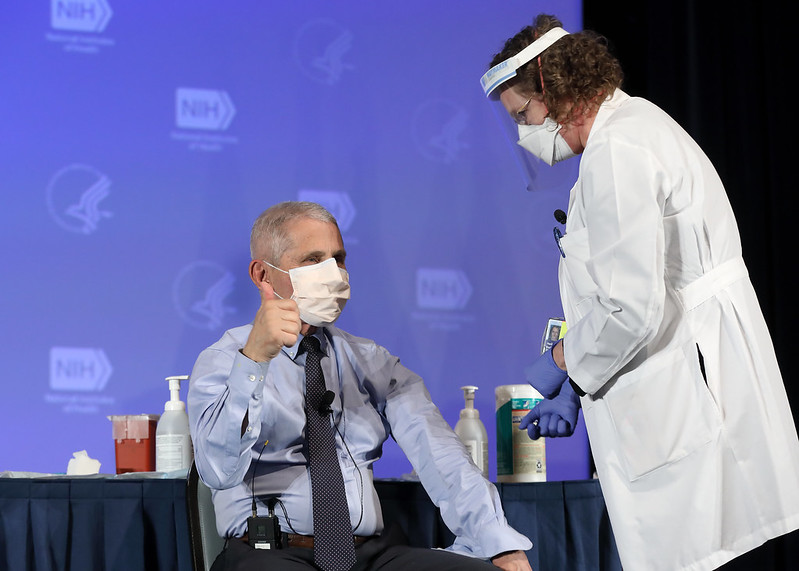
Dr. Anthony Fauci, NIAID Director, gives the thumbs up sign after receiving the Moderna COVID-19 vaccine at the HHS/NIH COVID-19 Vaccine Kick-Off event at NIH on 12/22/20.
In Spectator World, Jennifer Sey details the evidence that there was “no measurable difference in outcome,” for those who wore any type of mask, or no mask at all. Now, explains Sey, “What remains to be studied and discussed, in detail, are the harms that masking has caused at both the individual and societal level.” She writes:
It’s tough to rank the discriminatory pandemic practices of the last three years. We were divided into essential and inessential workers; in blue states and cities, private school students were permitted to attend school while public school students remained shuttered at home for eighteen months; children were barred from essential developmental activities like school and sports while adults went to bars and concerts and professional sporting events in venues with more than 50,000 people; and those unable to wear masks or function when others wear them (the deaf and hearing impaired, for instance) were disregarded entirely.
Now, the findings from the recent Cochrane study, a meta-analysis conducted by a dozen researchers in six countries summarizing over seventy RCTs (randomized control trials), have made it clear: “Face coverings make little to no difference” in Covid infection and fatality rates. These trials compared the outcomes of wearing surgical masks versus no masks as well as wearing surgical masks versus the hallowed N95. No matter which mask was worn, there was no measurable difference in outcome.
What remains to be studied and discussed, in detail, are the harms that masking has caused at both the individual and societal level: language and developmental delays in children; deaf people unable to participate in society, to work, to communicate with others; victims of trauma unable to mask due to PTSD, prevented from entering public spaces. The list will go on.
One such PTSD victim is Colleen Flood, a Levi’s employee for over four years, who was fired in August 2021 for being unable to wear a mask. At the time of her termination, she was the store manager for the Riverhead outlet store in New York State.
As a victim of violent sexual assault, Flood suffered from PTSD as a result of that trauma and she was never able to wear a mask for an extended period of time. She attempted to comply with Levi’s mask mandate which was implemented as soon as stores re-opened in June 2020. But she was unable to wear a mask while working without debilitating feelings of panic and sheer terror.
Flood’s electronic medical record describes her condition as follows:
This is a 48 year old female with a history of PTSD and panic attacks who presents for initial consult. She reports that she is a survivor of a domestic violence relationship which included sexual, mental, and physical abuse, including a few incidents of being suffocated. She left this relationship 6 years ago with her young daughter. Since the mask mandate went into place at her place of work (she works as a store manager for Levi’s) she has experienced recurrence of anxiety, panic attacks, hypervigilance and flashbacks of when she was suffocated by her ex-husband. Patient [. . .] has difficulty wearing a mask for more than a few minutes at a time. She begins to experience the feeling of suffocation, surges in anxiety, hyperventilation, palpitations, and flashbacks (which include hearing her ex-partner threatening to kill her and that he will find her). This man was arrested for criminal obstruction of breathing and unlawful imprisonment 5-6 years ago but did not serve any jail time.
As the request from her doctor for a medical accommodation from Levi’s reads, Flood “has a significant trauma history which has resulted in a diagnosis of PTSD (Post-Traumatic Stress Disorder) which includes history of physical assault (specifically being choked/suffocated against her will) while involved in a relationship that involved severe Domestic Violence (DV). Because of this history, having to wear a facial mask for extended periods of time almost if not always triggers debilitating trauma-related flashbacks which make it very difficult, if not impossible, for patient to function in her full work-related capacity… Being unable to breathe freely and comfortably often triggers flashbacks of her terrifying past experiences of her breathing being restricted against her will.”
Read more here.
If you’re willing to fight for Main Street America, click here to sign up for my free weekly email.





